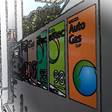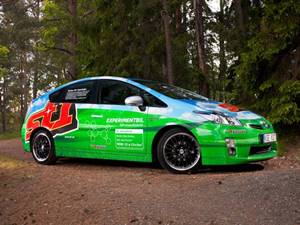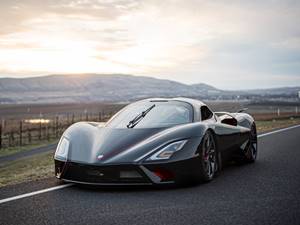Ford Kuga Ethanol E85 Flexifuel
Roman Frey 16:21 PM News

As a renewable alternative to gasoline, bioethanol is on the fast track: firstly, it is already present in gasoline at a level of 5 or 10% (E5 or E10), which contributes to reducing our fossil fuel imports by the same amount. But above all, E85 (up to 85% bioethanol) is attracting more and more consumers with its powerful argument: a price per liter more than half that of unleaded gasoline. And despite the 23% overconsumption it induces (lower energy density), the financial advantage amounts to hundreds of euros per year.
Although the development of the network of stations offering E85 is uneven depending on the country, in France, for example, 1,467 stations distribute E85 (August 2019 figure), i.e. 16% of French service stations. And, in total, there are more than 100,000 vehicles running on superethanol, some equipped with engines for E85, the others are fitted as original equipment by the manufacturers. This is because a dedicated engine adaptation is required and there was a first wave of retrofitting around 2006 in France, led by Ford, followed by brands such as Dacia and Renault. But low tax incentives and the embryonic distribution network did not allow this fuel to take off at the time. However, there is no shortage of advantages. It is a renewable fuel with no restrictions on use: it only has to be filled at a filling station equipped with a dedicated pump, but nothing prevents the use of conventional unleaded 95 or 98 fuel, which eliminates any fear of running out of gas, as in the case of NGV or electric vehicles.

Same performance, unchanged engine sound, identical instrumentation: at the wheel of a Flexifuel version, no difference with the original gasoline version. We find the 1.5 turbo that gives the Ford family a very decent performance (less than 10 seconds from 0 to 100 km / h), its dynamic road handling and good level of comfort. On the other hand, it is in the on-board computer that the difference will be obvious, with a higher fuel consumption, which is normal for a vehicle running on bioethanol (+23 to 25%).

On a mixed route driven at a slow pace, we stayed below 10 l/100 km, which is high but still acceptable given these characteristics. As a consequence of this excessive consumption, the range is necessarily decreasing, but fortunately, the tank offers a good capacity with its 60 l. Enough to enjoy the qualities of the Kuga without having to stop too often to refuel. We tested the manual transmission version, but the Kuga Flexifuel is also available with an automatic transmission with the same engine. No 4x4 transmission is available.

For only 100 euros more than the 150 hp EcoBoost gasoline version, this E85 version immediately attracted buyers, prompting Ford of France to take the original gasoline version out of the range and drastically reduce sales of the diesel version. It should be noted that instead of the approximately €1,000 required for an approved electronic box, the additional cost is all the lower because it includes engine modifications (specific fuel system, electronic management and injection, valve seat reinforcement) that guarantee long-term performance and allow the manufacturer's warranty to be maintained. At less than 30,000 euros in the Titanium version, it is a competitive family SUV, but it is a generation down the road. Note that in the manual gearbox version, it is eligible for the conversion premium. It should be remembered that, in addition, the registration of the car is free in most departments (except in Brittany and Picardy, where it is 50% free, and in the Centre-Val de Loire where it remains chargeable). Finally, for companies, 80% of the VAT on this fuel is recoverable.
It's simple, the Kuga E85 is absolutely the only one to date to offer such an original equipment. The only other possibilities to run on ethanol are through approved E85 conversion boxes, but beware, they systematically lose the manufacturer's warranty. Ford has just announced that it will market this type of gearbox (Biomotors brand) in its network but, cautiously, the manufacturer explains that it is intended for vehicles whose warranty has expired... With the development of demand, let's bet that other manufacturers will soon join this market. Ford mentions the arrival of adaptation to smaller engines for B-segment vehicles, while recalling that no technological objection excludes the combination of E85 and hybridization.
The solution proposed by this Kuga FlexiFuel is devilishly attractive, especially since the recent measures relating to homologation standards, which allow to escape any malus (60 euros on the BVA version). An atypical choice (and temporary pending new models in next year's range) that this vehicle is at the end of its life but with an unbeatable advantage for its cost of use, adding the manufacturer's warranty to reassure the most skeptical. Aside from these aspects, the Ford has some good leftovers with space, comfort and the right level of equipment expected of a family SUV.
- Power rating: 150 hp
- Fuel: Gasoline + E85
- Start-Stop system
- 1.5 Ecoboost
- 1498 cm3
- Warranty 2 years
- Length: 4.53 meters
- 5 seats
- Mixed fuel consumption WLTP Gasoline: 6.7 l/100 km
- Mixed Fuel Consumption WLTP E85: 10 l/100 km
- Price: From 19670 € (excluding taxes)

As a renewable alternative to gasoline, bioethanol is on the fast track: firstly, it is already present in gasoline at a level of 5 or 10% (E5 or E10), which contributes to reducing our fossil fuel imports by the same amount. But above all, E85 (up to 85% bioethanol) is attracting more and more consumers with its powerful argument: a price per liter more than half that of unleaded gasoline. And despite the 23% overconsumption it induces (lower energy density), the financial advantage amounts to hundreds of euros per year.
Although the development of the network of stations offering E85 is uneven depending on the country, in France, for example, 1,467 stations distribute E85 (August 2019 figure), i.e. 16% of French service stations. And, in total, there are more than 100,000 vehicles running on superethanol, some equipped with engines for E85, the others are fitted as original equipment by the manufacturers. This is because a dedicated engine adaptation is required and there was a first wave of retrofitting around 2006 in France, led by Ford, followed by brands such as Dacia and Renault. But low tax incentives and the embryonic distribution network did not allow this fuel to take off at the time. However, there is no shortage of advantages. It is a renewable fuel with no restrictions on use: it only has to be filled at a filling station equipped with a dedicated pump, but nothing prevents the use of conventional unleaded 95 or 98 fuel, which eliminates any fear of running out of gas, as in the case of NGV or electric vehicles.

Same performance, unchanged engine sound, identical instrumentation: at the wheel of a Flexifuel version, no difference with the original gasoline version. We find the 1.5 turbo that gives the Ford family a very decent performance (less than 10 seconds from 0 to 100 km / h), its dynamic road handling and good level of comfort. On the other hand, it is in the on-board computer that the difference will be obvious, with a higher fuel consumption, which is normal for a vehicle running on bioethanol (+23 to 25%).

On a mixed route driven at a slow pace, we stayed below 10 l/100 km, which is high but still acceptable given these characteristics. As a consequence of this excessive consumption, the range is necessarily decreasing, but fortunately, the tank offers a good capacity with its 60 l. Enough to enjoy the qualities of the Kuga without having to stop too often to refuel. We tested the manual transmission version, but the Kuga Flexifuel is also available with an automatic transmission with the same engine. No 4x4 transmission is available.

For only 100 euros more than the 150 hp EcoBoost gasoline version, this E85 version immediately attracted buyers, prompting Ford of France to take the original gasoline version out of the range and drastically reduce sales of the diesel version. It should be noted that instead of the approximately €1,000 required for an approved electronic box, the additional cost is all the lower because it includes engine modifications (specific fuel system, electronic management and injection, valve seat reinforcement) that guarantee long-term performance and allow the manufacturer's warranty to be maintained. At less than 30,000 euros in the Titanium version, it is a competitive family SUV, but it is a generation down the road. Note that in the manual gearbox version, it is eligible for the conversion premium. It should be remembered that, in addition, the registration of the car is free in most departments (except in Brittany and Picardy, where it is 50% free, and in the Centre-Val de Loire where it remains chargeable). Finally, for companies, 80% of the VAT on this fuel is recoverable.
It's simple, the Kuga E85 is absolutely the only one to date to offer such an original equipment. The only other possibilities to run on ethanol are through approved E85 conversion boxes, but beware, they systematically lose the manufacturer's warranty. Ford has just announced that it will market this type of gearbox (Biomotors brand) in its network but, cautiously, the manufacturer explains that it is intended for vehicles whose warranty has expired... With the development of demand, let's bet that other manufacturers will soon join this market. Ford mentions the arrival of adaptation to smaller engines for B-segment vehicles, while recalling that no technological objection excludes the combination of E85 and hybridization.
The solution proposed by this Kuga FlexiFuel is devilishly attractive, especially since the recent measures relating to homologation standards, which allow to escape any malus (60 euros on the BVA version). An atypical choice (and temporary pending new models in next year's range) that this vehicle is at the end of its life but with an unbeatable advantage for its cost of use, adding the manufacturer's warranty to reassure the most skeptical. Aside from these aspects, the Ford has some good leftovers with space, comfort and the right level of equipment expected of a family SUV.
- Power rating: 150 hp
- Fuel: Gasoline + E85
- Start-Stop system
- 1.5 Ecoboost
- 1498 cm3
- Warranty 2 years
- Length: 4.53 meters
- 5 seats
- Mixed fuel consumption WLTP Gasoline: 6.7 l/100 km
- Mixed Fuel Consumption WLTP E85: 10 l/100 km
- Price: From 19670 € (excluding taxes)























